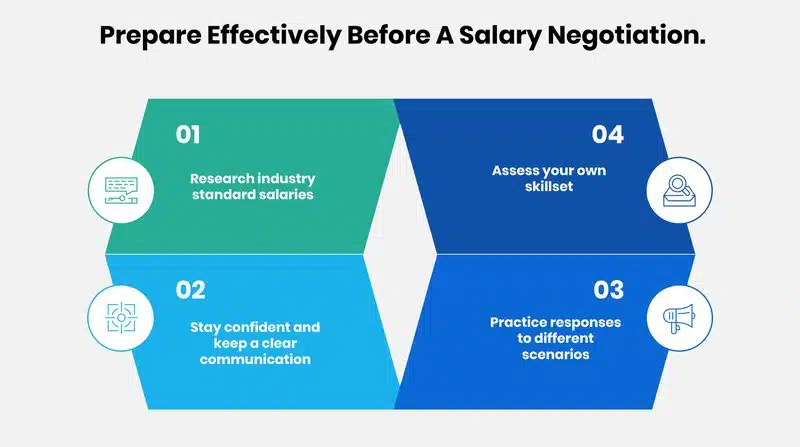Many people feel like they're playing a waiting game regarding salary negotiation. It's often nerve-wracking to ask for more money, but not negotiating can lead to tension and dissatisfaction down the line.
This article will explore tips on negotiating pay without getting stuck in the waiting game mentality. We'll examine common fears and mistakes discouraging people from seeking what they deserve. We will also discuss ways to prepare yourself mentally. This way, you will be confident when discussing your salary with your employer or potential employer.
Whether you're just starting out in your career or looking for a promotion, our advice will help you navigate the challenging waters of negotiations successfully. The article prepares you to achieve fair compensation for your skills and experience.
What Is The Salary Negotiation Waiting Game?
The salary negotiation waiting game refers to the anxiety-inducing period after you've asked for a raise or applied for a job with an expected higher pay rate.
You may find yourself dissecting every email and phone call from your employer. You may be wondering when they'll get back to you with their response. At the same time, you will be second-guessing if you should have even asked for it. However, this mental chess game can lead to lost opportunities and undervaluing your worth.
To avoid succumbing to the waiting game mentality during salary negotiations, it's important to prepare effectively beforehand. This means:
- Researching industry standard salaries for your position
- Assessing your own skillset and value proposition as an employee
- Practicing responses to different scenarios that might unfold during negotiations
- Staying confident while keeping clear communication throughout the process.
While feeling uncomfortable is natural, taking ownership of our desired compensation shows you believe in your capabilities. You show employers the worthiness of fair pay.

How Many Rounds Of Salary Negotiation Are On Average?
Regarding salary negotiation, the number of rounds varies depending on the situation. On average, two to three rounds of negotiation are common in most cases. The first round typically involves the initial offer and your response with counterterms or clarification questions. From there, negotiations may continue until a mutually beneficial agreement is reached.
However, some companies have established policies that limit or prevent further negotiation after certain rounds. For example, they may state that their original offer is non-negotiable or only allow one counteroffer round before finalizing terms.
Researching company policies and understanding your bargaining power before negotiations is essential.
In any case, it's crucial to go into salary negotiations feeling confident and well-prepared. Search for knowledge about industry standards and your worth as an employee.
While negotiating can be uncomfortable, it’s important not to let fear hold you back from advocating for yourself to achieve fair compensation in the long term.
How Long Should You Wait To Call Back In A Salary Negotiation?
When it comes to salary negotiation, time is of the essence. However, determining how long to wait before following up can be tricky.
Giving your employer some space and time to consider your request is important. However, you don't want them to forget about you entirely.
Generally speaking, waiting for 2-3 days before following up after an initial negotiation conversation is appropriate. This provides both parties with enough time for reflection without losing momentum.
Of course, the timing also depends on where you are in the hiring process. If you're still in the early stages of discussions, waiting until closer to the end might be best. There may be more evident interest from your potential employer.
Remember that even if you decide not to follow up immediately, ensure you're clear and concise during initial negotiations. This way, there are no misunderstandings or confusion down the line. It keeps communication open between yourself and your “would-be” boss. It also lets everyone know exactly what they agree upon moving forward into employment together!
Will Negotiating Salary Backfire?
Negotiating salary can be a tricky business. And the salary negotiation waiting game can be challenging. While it's natural to feel hesitant about asking for more money, failing to negotiate could lead to dissatisfaction and resentment later on.
However, there are some potential pitfalls that you need to consider before launching into negotiations.
One of the biggest worries people have is that negotiating their salary will backfire and harm their career prospects. The fear is that management might see such requests as demanding or challenging behavior and hold them against you in the future.
There's also the possibility of being labeled a troublemaker by colleagues who don't share your approach. It's important to weigh these risks against the benefits of getting what you deserve.
With careful planning and preparation beforehand, navigating these kinds of conversations should be possible without any negative consequences.
By researching industry norms ahead of time, benchmarking pay rates in similar roles.
Also, you can demonstrate value convincingly enough by showcasing examples of previous exceptional work – among other strategies. You not only justify an increase but also earn respect.
What Happens If You Ask For More Than They Are Willing To Pay?
When negotiating salary, it's essential to balance what you believe you deserve and what the company is willing to pay.
Yet, one mistake that many people tend to make is asking for an excessive amount of money. This can have detrimental effects on your chances of getting hired or even keeping your current job.
If you ask for too much money during negotiations, it can cast doubt on your value as an employee. It can make you seem unrealistic in terms of expectations. It could even give the impression you are more interested in financial gain than contributing to the company's mission and goals. In worst-case scenarios, this may lead employers or potential employers to pass on hiring you altogether.
Ultimately, when conducting salary negotiations, preparation and research are key factors that will help ensure a successful outcome:
Determine ahead of time what your ideal salary would be based on industry norms. Find out specifics related to cost-of-living expenses if necessary. Also, remember how much money they'll pay and other benefits they offer, such as health insurance packages or retirement savings plans. It may affect the overall compensation package decision-making process – so try looking at those too!
Being realistic about job requirements while still advocating for yourself can help lead to positive negotiation results. It can prevent you from any significant consequences of asking "too high up there."
How Long Does It Take To Negotiate A Job Offer?
Negotiating a job offer is often seen as a daunting task that can take some time. The average negotiation process usually takes two to four weeks, from the initial offer to acceptance or rejection.
However, this timeframe can vary depending on factors such as:
- The industry.
- The employer's urgency to fill the role.
- And the candidate's willingness to negotiate.
During negotiations, candidates must balance expressing their salary expectations while not coming across too aggressively.
It's crucial for you to keep in mind that employers want enthusiastic employees who are excited about joining the company. Much more than someone who is just focused on money. Ultimately both parties should feel satisfied with the outcome of any negotiation discussion.

Overall it's essential for individuals entering into a job offer negotiation process to research beforehand.
You need to understand there might be certain limitations or constraints set by potential employers. This may hinder requests for higher remuneration packages.
Honesty throughout discussions will help develop strong relationships between both parties. However, patience is required when waiting on responses if prolonged negotiations occur. It may occur due to differing opinions between applicants and hiring managers.
How Long Does It Take To Hear Back From Salary Negotiation?
Negotiating your salary can be intimidating; the waiting game after requesting a raise can add to the anxiety. The amount of time it takes to hear back from salary negotiations varies. Many factors are at play:
- Company policy or procedures.
- The size of the organization.
- Or how busy your employer or HR department is.
If you're negotiating for a new position, it's common to receive a response within 2-3 days after making your request.
However, if you're currently employed and asking for a raise or promotion, it may take longer because more deliberation is required.
It's essential to follow up if you haven't received an answer in two weeks; don't hesitate to take the initiative even if it feels uncomfortable.
Waiting for results after asking for a higher salary doesn't have to drive you crazy; instead, focus on having realistic expectations while remaining flexible about possible outcomes.
Remember always to adopt a positive attitude. Getting caught up in doubt and worry won’t serve you well during this critical process!
What Makes A Salary Negotiation Take Longer?
Several factors can contribute to prolonging a salary negotiation.
Firstly, it's important to remember that negotiating a fair salary takes time and patience. This is especially true when both parties have different expectations, or there's little room for negotiation due to budget constraints.
Another reason negotiations may take longer is if the job requires specific skills or experiences in high demand. In this case, employers may be willing to stretch their budget to secure top talent. In this case, they need extra time to assess the candidate pool and evaluate their options carefully.
Finally, some people find negotiating difficult because they lack confidence or feel uncomfortable discussing money openly. This can also cause delays since communication breakdowns often occur during salary negotiations when one party isn't clear on what they want or doesn't express themselves effectively.
Ultimately, being mindful of these potential hold-ups and taking proactive steps can help you better prepare yourself mentally for the negotiating process. So remember:
- Researching industry standards for salaries
- Understanding your market value
- And gathering information about company culture
This way, you can confidently ask for what you're worth without getting stuck in a waiting game mentality.
What Should You Do If HR Is Not Responding After Salary Negotiation
If HR is not responding after salary negotiation, following up politely and professionally is important. Start by sending a follow-up email or scheduling a meeting with HR to discuss the status of your salary negotiations. It's possible that they are still working on finalizing details or waiting for approval from higher-ups.
If you've tried reaching out multiple times without any response, consider speaking to your supervisor or manager about the situation. They may be able to help get the ball rolling and ensure that HR is responsive to your request.
Remember, patience is key when it comes to salary negotiation. While not receiving an immediate response can be frustrating, showing professionalism and persistence can go a long way in achieving desirable results.
How Do You Follow Up On A Salary Negotiation?
Following up on salary negotiation is important in securing the compensation you deserve.
The first thing to remember is to be patient. Employers may need time to review your request and consider their options. A simple email thanking them for their time, expressing your continued interest in the position, and asking about any updates can help keep communication open.
If you haven't heard back after a week or two, it's okay to follow up again and reiterate you are still interested in the position. Tell them you would like to know if there has been any progress with your salary negotiation request.
It's essential not to come across as pushy or demanding during this follow-up communication – being polite yet persistent should suffice.

Bottom Line
Remember that negotiations are often ongoing conversations, so don't hesitate to ask questions if things aren't clear or if a new question arises.
Keeping lines of open communication shows that you're engaged with the process but respectful of everyone involved's time constraints.
Following these steps will increase your chances of reaching your goals from any salary negotiation without playing too much waiting game!

Christian has over ten years of experience in marketing agencies. Currently, he has been dedicating his time to a tech startup and also writing for major publications. He loves podcasts and reading to keep up with the latest trends in marketing.
